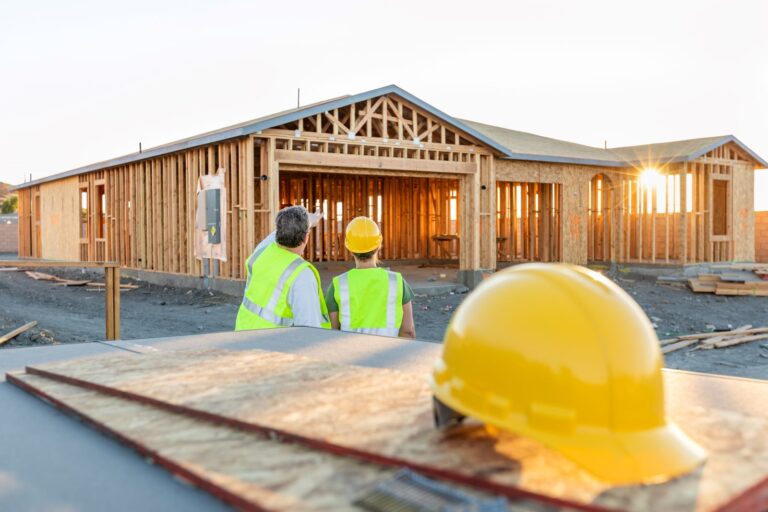How To Best Manage Tradespeople When Building A Home

There are so many different aspects to building a home, from finding the land and designing the build to getting all the necessary approvals and putting together a build team. One of the most critical aspects of the build process is managing all the different trades who will be working on your home. Many different tradespeople will be needed to build a home, from electricians and plumbers to carpenters and bricklayers.
If you are considering taking on a home-building project, you must learn how to manage tradespeople. Things like what is a master builder and why you should hire one. This is not always easy, as many different personalities are involved in construction. However, if you take the time to learn about the different types of tradespeople and how to manage them, you can get the job done without any problems.
The first thing you need to do when learning how to manage tradespeople is to understand the different types of trades needed to build a house. These are the main types of trades: electricians, plumbers, builders, tilers, Heat Pump technicians, and general labourers. Each of these trades has their own set of skills and knowledge. As a result, it is vital that you learn about the different types of trades so that you can better manage them.
Build A Relationship
Having a good relationship with all the tradespeople you manage who will be working on your home is essential, as they will all work together to create your dream home. One of the best ways to build a good relationship with the tradespeople working on your home is to understand what you want from the build clearly. You should sit down with your architect or designer and go through all the different aspects of the build to clearly understand what you want.
Communicate Clearly
Once you have selected the tradespeople you want to work with, be sure to communicate clearly with them about what you expect. Ensure you have a contract that spells out the scope of work and timeline for the project. Also, consider safety around your home for tradespeople.
Foundation, Frame and Finishing
The first step is to identify the different trades that will be involved in your build. These trades can be broadly categorised into three groups: the foundation trades, the frame trades and the finishing trades.
The foundation trades are responsible for laying the foundations and laying the groundwork for the building. This includes jobs such as excavation, concrete work and bricklaying. The frame trades are responsible for erecting the frame of the house. This includes jobs such as carpentry, roofing and glazing. The finishing trades are responsible for completing the build. This includes jobs such as plastering, painting and tiling.
Once you have identified the different trades that will be involved in your build, you need to identify the most effective communication channels for each trade. The foundation trades, for example, will need to be communicated via email or phone as they often work off-site. On the other hand, the frame trades can be communicated face-to-face as they often work on-site. The finishing trades can also be communicated face-to-face, but it is important to note that they often have a lot of direct contact with the clients, so it is crucial to ensure your message is clear and concise.
Be Clear and Concise
When communicating with tradespeople you manage, it is important to be clear and concise. Make sure you state what needs to be done when you need it and how you would like it done. It is also essential to be realistic in your expectations and to give the tradespeople enough time to complete the work.
Finally, remember to thank the tradespeople for their work. A simple thank you can go a long way in building good relationships with tradespeople.
Pay Attention to the Detail
If you are having tradespeople build your home, speaking your mind and paying attention to details is essential. Otherwise, you may end up with a home that does not meet your expectations.
When speaking with the tradespeople, be sure to tell them precisely what you want. Do not be afraid to be specific. The more specific you are, the less likely it is that there will be misunderstandings.
It is also essential to pay attention to details. For example, ensure the tradesperson knows if you want a specific type of tile in your bathroom. Otherwise, you may end up with a bathroom that looks nothing like you wanted.
You should also trust your instincts. If something doesn’t feel right, trust your instincts and ask questions. It is better to be safe than sorry, and if there is something that you are unsure about, it is always best to ask.
Being as involved as possible in constructing your home is generally a good idea. This way, you can be sure that everything is being done how you want it.
Having Patient
You should be patient when tradespeople are building your home for many reasons. Building a home is a very complex and time-consuming process. There are a lot of different trades involved in building a home, and each trade has its own unique set of skills and knowledge. It takes time for all of the different trades to come together and build a home.
You should be patient when tradespeople build your home because quality workmanship is very important. A home is a significant investment, and you want to ensure it is built to last. Tradespeople who are rushed or who do not have enough time to do a good job can end up doing a poor job, which can cost you a lot of money in the long run.
Furthermore, the safety of the workers and those living in the home is very important. Building a home is a dangerous job, and many things can go wrong. If the workers are not careful, they can injure themselves or others. So just be patient and do not make them rush a task.
Building or renovating a home can be a stressful process. Be patient with the tradespeople, and remember that they are working to create your vision.
Create A Schedule
Creating a schedule in advance is crucial if you plan on having tradespeople work on your home. This will ensure that the work is completed promptly and efficiently. It will also allow you to keep track of the progress and ensure that everything is going according to plan. Here are some of the benefits of creating a schedule for tradespeople building your home:
Saving You Time and Money
If you don’t have a schedule, you will likely end up wasting time and money. This is because you will constantly call different tradespeople to come and work on your home, which can be very costly. By having a schedule, you can save both time and money.
Keeps You Organised
If you have a lot of tradespeople working on your home, it can be challenging to keep track of everything. This is why it is important to have a schedule. This way, you will know exactly who is working on what and when they are supposed to be finished.
Reducing Stress
It can be very stressful if you constantly worry about whether or not the work is getting done. Having a schedule lets you relax and know that everything is going according to plan.
Improve Communication
It will make communication easier. Communicating with the different tradespeople will be much easier if you have a schedule. This is because you will know exactly who to contact and when.
It will Ensure that the Work is Done Properly
If you don’t have a schedule, it is very easy for things to go wrong. This is because there is no set plan for the work to be done. However, if you have a schedule, the work will be done in a specific order, which will help ensure that everything is done correctly.
Overall, there are many benefits to having a schedule for tradespeople building your home. If you plan on having work done on your home, it is worth creating a schedule in advance. Using job management software designed explicitly for tradespeople will make the whole project much more effortless.
Security
When building a house, many people come and go. Having reliable security cameras on the property can help give you peace of mind when you cannot always be on-site. It also holds people accountable if things go missing or get misplaced.

There are so many different aspects to building a home, from finding the land and designing the build to getting all the necessary approvals and putting together a build team. One of the most critical aspects of the build process is managing all the different trades who will be working on your home. Many different tradespeople will be needed to build a home, from electricians and plumbers to carpenters and bricklayers.
If you are considering taking on a home-building project, you must learn how to manage tradespeople. Things like what is a master builder and why you should hire one. This is not always easy, as many different personalities are involved in construction. However, if you take the time to learn about the different types of tradespeople and how to manage them, you can get the job done without any problems.
The first thing you need to do when learning how to manage tradespeople is to understand the different types of trades needed to build a house. These are the main types of trades: electricians, plumbers, builders, tilers, HVAC technicians, and general labourers. Each of these trades has their own set of skills and knowledge. As a result, it is vital that you learn about the different types of trades so that you can better manage them.
Build A Relationship
Having a good relationship with all the tradespeople you manage who will be working on your home is essential, as they will all work together to create your dream home. One of the best ways to build a good relationship with the tradespeople working on your home is to understand what you want from the build clearly. You should sit down with your architect or designer and go through all the different aspects of the build to clearly understand what you want.
Communicate Clearly
Once you have selected the tradespeople you want to work with, be sure to communicate clearly with them about what you expect. Ensure you have a contract that spells out the scope of work and timeline for the project. Also, consider safety around your home for tradespeople.
Foundation, Frame and Finishing
The first step is to identify the different trades that will be involved in your build. These trades can be broadly categorised into three groups; the foundation trades, the frame trades and the finishing trades.
The foundation trades are responsible for laying the foundations and laying the groundwork for the building. This includes jobs such as excavation, concrete work and bricklaying. The frame trades are responsible for erecting the frame of the house. This includes jobs such as carpentry, roofing and glazing. The finishing trades are responsible for completing the build. This includes jobs such as plastering, painting and tiling.
Once you have identified the different trades that will be involved in your build, you need to identify the most effective communication channels for each trade. The foundation trades, for example, will need to be communicated via email or phone as they often work off-site. On the other hand, the frame trades can be communicated face-to-face as they often work on-site. The finishing trades can also be communicated face-to-face, but it is important to note that they often have a lot of direct contact with the clients, so it is crucial to ensure your message is clear and concise.
Be Clear and Concise
When communicating with tradespeople you manage, it is important to be clear and concise. Make sure you state what needs to be done when you need it and how you would like it done. It is also essential to be realistic in your expectations and to give the tradespeople enough time to complete the work.
Finally, remember to thank the tradespeople for their work. A simple thank you can go a long way in building good relationships with tradespeople.
Pay Attention to the Detail
If you are having tradespeople build your home, speaking your mind and paying attention to details is essential. Otherwise, you may end up with a home that does not meet your expectations.
When speaking with the tradespeople, be sure to tell them precisely what you want. Do not be afraid to be specific. The more specific you are, the less likely it is that there will be misunderstandings.
It is also essential to pay attention to details. For example, ensure the tradesperson knows if you want a specific type of tile in your bathroom. Otherwise, you may end up with a bathroom that looks nothing like you wanted.
You should also trust your instincts. If something doesn’t feel right, trust your instincts and ask questions. It is better to be safe than sorry, and if there is something that you are unsure about, it is always best to ask.
Being as involved as possible in constructing your home is generally a good idea. This way, you can be sure that everything is being done how you want it.
Having Patient
You should be patient when tradespeople are building your home for many reasons. Building a home is a very complex and time-consuming process. There are a lot of different trades involved in building a home, and each trade has its own unique set of skills and knowledge. It takes time for all of the different trades to come together and build a home.
You should be patient when tradespeople build your home because quality workmanship is very important. A home is a significant investment, and you want to ensure it is built to last. Tradespeople who are rushed or who do not have enough time to do a good job can end up doing a poor job, which can cost you a lot of money in the long run.
Furthermore, the safety of the workers and those living in the home is very important. Building a home is a dangerous job, and there are a lot of things that can go wrong. If the workers are not careful, they can injure themselves or others. So just be patient and do not make them rush a task.
Building or renovating a home can be a stressful process. Be patient with the tradespeople, and remember that they are working to create your vision.
Create A Schedule
Creating a schedule in advance is crucial if you plan on having tradespeople work on your home. This will ensure that the work is completed promptly and efficiently. It will also allow you to keep track of the progress and ensure that everything is going according to plan. Here are some of the benefits of creating a schedule for tradespeople building your home:
Saving You Time and Money
If you don’t have a schedule, you will likely end up wasting time and money. This is because you will constantly call different tradespeople to come and work on your home, which can be very costly. By having a schedule, you can save both time and money.
Keeps You Organised
If you have a lot of tradespeople working on your home, it can be challenging to keep track of everything. This is why it is important to have a schedule. This way, you will know exactly who is working on what and when they are supposed to be finished.
Reducing Stress
It can be very stressful if you constantly worry about whether or not the work is getting done. Having a schedule lets you relax and know that everything is going according to plan.
Improve Communication
It will make communication easier. Communicating with the different tradespeople will be much easier if you have a schedule. This is because you will know exactly who to contact and when.
It will Ensure that the Work is Done Properly
If you don’t have a schedule, it is very easy for things to go wrong. This is because there is no set plan for the work to be done. However, if you have a schedule, the work will be done in a specific order, which will help ensure that everything is done correctly.
Overall, there are many benefits to having a schedule for tradespeople building your home. If you plan on having work done on your home, it is worth creating a schedule in advance. Using job management software designed explicitly for tradespeople will make the whole project much more effortless.
Security
When building a house, many people come and go. Having reliable security cameras on the property can help give you peace of mind when you cannot always be on-site. It also holds people accountable if things go missing or get misplaced.
Conclusion
The best way to manage tradespeople when building a home is to be organised, have a plan and communicate effectively. By following these tips, you will be able to avoid many of the common problems that can occur during construction. By being proactive and communicating with your tradespeople, you can ensure your home-building project goes smoothly.
Get your business noticed by creating an online directory listing. Listings are FREE and you can create as many as you need.
- Get found by locals



